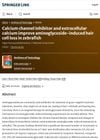Search
for
Sort by
Research
30 / 843 results
research Cytostatics and Immunosuppressive Drugs: Toxicities and Management
Some cancer and immune system drugs can cause serious side effects, including heart, lung, nerve, and organ damage, which need careful monitoring and management.
research Using the Zebrafish Lateral Line to Uncover Novel Mechanisms of Action and Prevention in Drug-Induced Hair Cell Death
Zebrafish helped find new ways to prevent drug-induced hair cell death and potential treatments for hearing loss.

research Diuretics
Diuretics help the body get rid of excess salt and water by acting on the kidneys in different ways.

research Vestibular Hair Cell Regeneration and Restoration of Balance Function Induced by Math1 Gene Transfer
Gene therapy with the Math1 gene helped regenerate balance-related cells and improve balance in mice.

research Development of Gene Therapy for Inner Ear Disease: Using Bilateral Vestibular Hypofunction as a Vehicle for Translational Research
Gene therapy, especially using atoh1, shows promise for creating functional sensory hair cells in the inner ear, but dosing and side effects need to be managed for clinical application.

research Natural Bisbenzylisoquinoline Derivatives Protect Zebrafish Lateral Line Sensory Hair Cells from Aminoglycoside Toxicity
Some natural compounds can protect fish ear cells from damage by certain antibiotics without affecting the antibiotics' ability to fight infections.

research Adverse Effects of Opioid Analgesic Drugs
Opioid painkillers can cause many side effects, including breathing problems and addiction, but are generally considered safe when used properly.

research Effect of Low-Level Laser Therapy on Hair Cell Regeneration Following Gentamicin-Induced Ototoxicity in Postnatal Organotypic Culture of Rat Cochlea
Low level laser therapy may help regenerate hair cells in the ear after damage from gentamicin.

research Molecular Basis of Hair Cell Loss
The document concludes that there are no effective clinical treatments for hearing loss due to hair cell damage, but research is ongoing.

research Drug Delivery System Based On Minoxidil Nanoparticles Promotes Hair Growth In C57BL/6 Mice
Minoxidil nanoparticles can potentially be a more effective treatment for hair growth than current treatments.

research Hair Cell Toxicology: With the Help of a Little Fish
Zebrafish larvae are used to study and find treatments for ear cell damage because they are easier to observe and test than mammals.

research Mechanism of Action of Herbs and Their Active Constituents Used in Hair Loss Treatment
Some herbs and their components might help treat hair loss by affecting various biological pathways, but more research and regulation are needed.

research Behavioral Dermatology
Behavioral dermatology treats skin problems by considering both emotional and physical factors.

research Side Effects of Common Acne Treatments
Common acne treatments can cause various side effects, like skin irritation and more serious issues, but combination therapies are often more effective and better tolerated.

research Dermatologic Diseases in Ferrets: Comprehensive Review and Treatment
The document concludes that early diagnosis and treatment are crucial for managing skin diseases in ferrets.

research Melatonin Protects Cochlear Hair Cells from Nicotine-Induced Injury Through Inhibiting Apoptosis, Inflammation, Oxidative Stress, and Endoplasmic Reticulum Stress
Melatonin may protect ear cells from damage caused by nicotine.

research Abstracts
The document reports findings on genetic research, including ethical concerns about genome editing, improved diagnosis of mitochondrial mutations, solving inherited eye diseases, confirming gene roles in epilepsy, linking a gene to aneurysms, and identifying genes associated with age-related macular degeneration.

research Autophagy-Related Protein 12 Associates With Anti-Apoptotic B Cell Lymphoma-2 to Promote Apoptosis in Gentamicin-Induced Inner Ear Hair Cell Loss
Blocking autophagy increases survival of inner ear hair cells exposed to gentamicin.

research TCM Medicine and Food Homology in the Management of Post-COVID Disorders
Traditional Chinese medicinal foods may help manage long-term post-COVID symptoms.

research Analysis of Androgen Receptor Expression and Activity in the Mouse Brain
Androgen receptors in the mouse brain may explain cognitive and mood changes in prostate cancer treatment.

research Retinoids
Retinoids are effective for skin conditions like severe acne and psoriasis but must be used with caution due to potential side effects and risks during pregnancy.

research Phenytoin Associated Alopecia: Drug Induced Lupus
Phenytoin, a medication, can cause hair loss and trigger a condition similar to lupus.
research Chemical Screening for Hair Cell Loss and Protection in the Zebrafish Lateral Line
PROTO1 and PROTO2 protect against hearing damage.

research Calcium Channel Inhibitor and Extracellular Calcium Improve Aminoglycoside-Induced Hair Cell Loss in Zebrafish
Certain substances can protect against ear damage from some antibiotics in zebrafish.
research The Role of Nrf2 in Hearing Loss
Activating Nrf2 can help protect against hearing loss.
research Myc and Fgf Are Required for Zebrafish Neuromast Hair Cell Regeneration
Zebrafish need MYC and FGF to regenerate inner ear hair cells.

research The Clinical Management of Testosterone Replacement Therapy in Postmenopausal Women with Hypoactive Sexual Desire Disorder: A Review
Testosterone Replacement Therapy can improve sexual health in postmenopausal women with low sexual desire, but more research is needed on its long-term effects.

research Clinical and Genetic Aspects of Alopecia Areata: A Cutting Edge Review
Hair loss from Alopecia Areata is caused by both genes and environment, with several treatments available but challenges in cost and relapse remain.
research Locally Synthesized 17-Beta-Estradiol Reverses Amyloid-Beta-42-Induced Hippocampal Long-Term Potentiation Deficits
A brain-made hormone can protect against memory-related brain damage caused by harmful proteins.